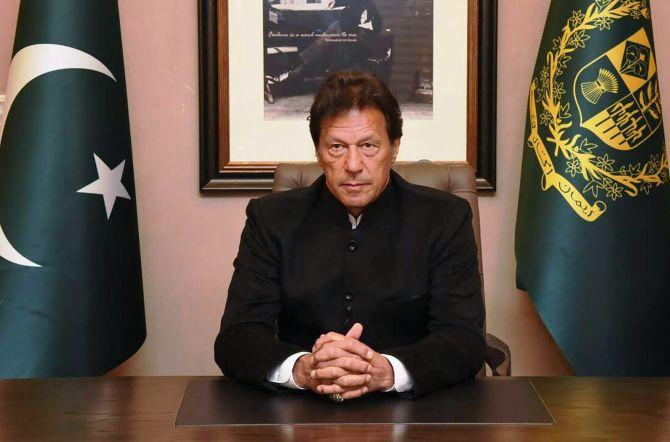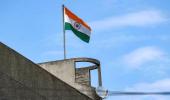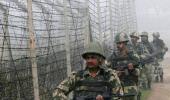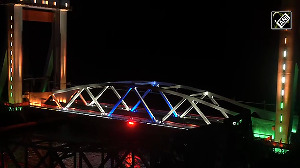India cannot afford to be complacent about a possible Pakistan resort to military options across the LoC, warns Rana Banerji, who headed the Pakistan desk at the Research and Analysis Wing, India's external intelligence agency.

Issuing a new 'political map' of Pakistan on the eve of observing 'Exploitation Day' in Kashmir (yuam-e-istehsaal) is a deliberately provocative attempt by Pakistan to raise temperatures on the diplomatic front at a moment of perceived Indian discomfiture after China's agression on the Line of Actual Control.
The map makes four changes -- taking Pakistan's eastern border further eastward to encompass the whole of 'disputed Jammu and Kashmir', extending the Line of Control now to Chinese territory even if keeping the border there open-ended, including Sir Creek upto its eastern land boundary and reiterating its claim over Siachen.
Defying any logic, Junagadh is raked up.
Prime Minister Imran Khan described this as 'the first step to intensify Pakistan's struggle' to realise its 70-year-old dream of making Kashmir a part of Pakistan ('Kashmir banega Pakistan').
He did not attend the all party and press briefing organised by the Pakistan foreign office, where it was left to Foreign Minister Shah Mehmood Quereshi to reiterate familiar Pakistani positions on giving a message to the international community that Pakistan was fighting to focus attention on continuing human rights violations in 'occupied' J&K after August 5 last year, while it still stood by the UN resolutions on Kashmir.
Significantly, the meeting was attended by Lieutenant General Faiz Hamid, Director General, Inter Services Intelligence, leaving no one in any doubt that the move had the army leadership's blessings.
It is likely, taking a leaf out of the Nepal book, the Pakistani establishment will soon take the 'political map' to a joint session of the national assembly and senate, passing a resolution there, in riposte to India's October 2019 move on PoK and Gilgit Baltistan .
Participating in a media programme on August 4 night, President Arif Alvi said this was 'a symbolic statement of our position and determination to take the issue towards a final solution'.
Alvi alleged that Indian actions reflected 'a rewriting of history', taking the country on 'a path of hatred' between communities.
He deplored the Indian government's 'Nazi and Israeli type' tactics to change the demography of Kashmir by implementing changed policies on domicile and holding of property there.
He did not rule out debate in Pakistani legislatures to 'reserve' electoral constituencies for parts of Kashmir 'illegally held by India'.
On another Pakistan television channel, Moeed Yusuf, strategic assistant to Prime Minister Khan and a former US Institute of Peace researcher, asserted that this did not alter Pakistan's position at the United Nations, but signified Pakistan's 'just political aspirations'.
When questioned, he confirmed that the move had China's implicit support.
Moeed accompanied Imran and army chief General Qamar Javed Bajwa on their tour of forward areas of the LoC during Eid ul Azha and to Muzaffarabad, Pakistan occupied Kashmir, where they met the PoK president, PM and members of the PoK legislative assembly.
Though Foreign Minister Quereshi was visibly irritated by the lukewarm response from the Organisation of Islamic Conference and Saudi Arabia on the Kashmir issue, the Pakistani media continues to be in overdrive, claiming great success in achieving life size poster displays at Times Square, New York, on alleged human rights violations in Kashmir.
Much has been made of renaming the Muree Muzaffarabad road from 'Kashmir Highway' to 'Srinagar Highway'.
Though sections of civil society in Pakistan and some Opposition leaders supported the establishment, holding that Prime Minister Narendra Modi was 'himself proving to be India's biggest enemy', others like ex-Senator Farhatullah Babar of the People's Party of Pakistan criticised the government, questioning whether it had 'strengthened our principled stance' on Kashmir, especially as 'the people of Kashmir figured nowhere' in their calculus.
He reckoned it was a grave mistake for Pakistan to have made the announcement from Islamabad. Instead, it should 'have been made by Kashmiris themselves, from their own territory, not by Pakistani officials'.
In an interesting coincidence, General Bajwa addressed a gathering of senior retired army officers the same day, August 4, while visiting the IV Corps in Lahore.
Among others, two former army chiefs, General Jehangir Karamat and General Raheel Sharif, two former Chairman Joint Chiefs of Staff Committee, Generals Tariq Majeed and Rashad Mehmood, and a former Vice Chief, Lieutenant General Ahsan Salim Hayat attended.
The Inter Services Public Relations not only covered this interaction in a press release, but also issued a video showing General Bajwa, dressed in civies, addressing the others.
Apparently, discussions there covered 'wide ranging issues including professional matters, security situation in the region, measures to optimise dividends of peace and stability, and also the challenges and opportunities'.
While such meetings have been routine in the past, its timing and manner of disclosure seemed intended to convey very deliberately that this was a serious forum, being taken on board on important national security issues.
General Bajwa also wanted to convey, possibly to his own peer group of serving generals, some of whom were still remain sullen about his extension, that he was following a broadly consensual approach to decision making.
Against this backdrop of adventurous diplomatic over-reach by Pakistan, even though its economy remains mired in a downhill slide over chronic problems of rescheduling heavy debts, stagnant investments and depleting remittances from overseas Pakistanis, India cannot afford to be complacent about a possible Pakistan resort to military options across the LoC, if only tactical.
Careful vigil in this regard must continue.
Feature Presentation: Aslam Hunani/Rediff.com











 © 2025
© 2025